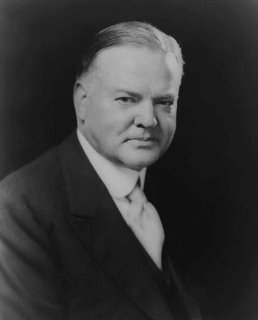
Today is the birthday of a great American and one of my favorite presidents, Herbert C. Hoover. Rarely has any man been so maligned in history. Prior to his presidency Hoover was widely referred to as “The Great Humanitarian” for his organizing the massive relief of the starving in post World War I Europe, especially Belgium, and for organizing the first ever Federal disaster relief project in response to the Great Mississippi River Flood of 1927 while serving as commerce secretary under President Calvin Coolidge (another favorite president of mine). He is generally acknowledged as being the first president to declare that government had an obligation in times of emergency to intervene on behalf of those who through no fault of their own were in distress. Although only in office for four years his administration had quite a record for a one term president. A few of his accomplishments are listed below from Wikpedia.
The President expanded civil service coverage, cancelled private oil leases on government lands and led the way for the prosecution of gangster Al Capone. He appointed a commission which set aside 3 million acres (12,000 km²) of national parks and 2.3 million acres (9,000 km2) of national forests; advocated tax reduction for low-income Americans; doubled the numbers of veteran hospital facilities; negotiated a treaty on St. Lawrence Seaway (which failed in the U.S. Senate); signed an act that made The Star-Spangled Banner the national anthem; wrote a Children's Charter that advocated protection of every child regardless of race or gender; built the San Francisco Bay Bridge; created an antitrust division in the Justice Department; required air mail carriers to improve service; proposed federal loans for urban slum clearances; organized the Federal Bureau of Prisons; reorganized the Bureau of Indian Affairs; proposed a federal Department of Education; advocated fifty-dollar-per-month pensions for Americans over 65; chaired White House conferences on child health, protection, homebuilding and homeownership;and signed the Norris-La Guardia Act that limited judicial intervention in labor disputes.
Hoover's humanitarian and Quaker reputation—along with a Native American vice president—gave special meaning to his Indian policies. He had spent part of his childhood in proximity to Indians in Oklahoma, and his Quaker upbringing influenced his views that Native Americans needed to achieve economic self-sufficiency. As President, he appointed Charles J. Rhoads as commissioner of Indian affairs. Hoover supported Rhoads' commitment to Indian assimilation and sought to minimize the federal role in Indian affairs. His goal was to have Indians acting as individuals (not as tribes) and assume the responsibilities of citizenship which had been granted with the Indian Citizenship Act of 1924. [Britten 1999]
In the foreign arena, Hoover began formulating what would be known as the Good Neighbor Policy by withdrawing American troops from Nicaragua and Haiti; he also proposed an arms embargo on Latin America and a one-third reduction in the world's navies, which was called the Hoover Plan. The Roosevelt Corollary ceased being part of U.S. foreign policy. He and Secretary of State Henry Stimson outlined the Hoover-Stimson Doctrine that said the United States would not recognize territories gained by force.








No comments:
Post a Comment